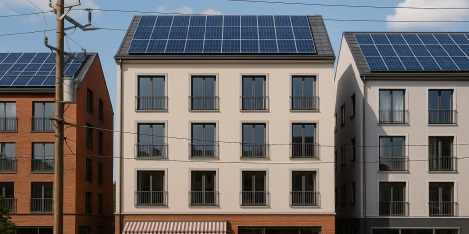The (temporary) end of a privilege
Following the European Court of Justice, the Federal Court of Justice has now also ruled. For the time being, it’s the end of the fun for the so-called Kundenanlage (customer system) and thus for many tenant electricity models and combined heat and power plants in Germany, which have long benefited from a privileged status for local grids.
What happened?
An energy supply company wanted to build two combined heat and power plants in a neighborhood with a total of 10 apartment blocks with over 250 residential units and sell the electricity generated to the tenants of the apartments. In return, the company wanted the local distribution network operator to provide connections to its network and metering points. The distribution grid operator did not like this and refused – it would only work for Kundenanlagen (customer systems) and this was not the case. The energy supply company then had this reviewed by the courts.
What has case law said about this?
The Federal Court of Justice was not so sure about this either, because it is primarily a matter of European law. And in such cases, it is better to ask the European Court of Justice. And its answer, which the Federal Court of Justice has now confirmed, was clear: a customer installation may not simultaneously constitute a distribution network within the meaning of European law. However, the line systems planned by the energy supply company for the district are such distribution networks. The operator must therefore comply with the relevant regulatory requirements and does not benefit from the privileges of a customer installation. And that means – we are in Germany and in Europe – a lot of fun with a lot of regulations to be observed. In addition, the whole thing will also lead to higher costs for end customers, as grid fees will be payable from now on. This will make local energy generation much more complicated and therefore more expensive.
What happens now?
The new German government had pledged to quickly make Germany less bureaucratic and reduce electricity prices. The decision is counterproductive for both. For the energy transition anyway.
And even worse: the legislator can do little at national level for the time being, because the whole thing comes from Brussels. It will therefore be interesting to see how the new German government deals with the decision and when it will make representations to Brussels.





